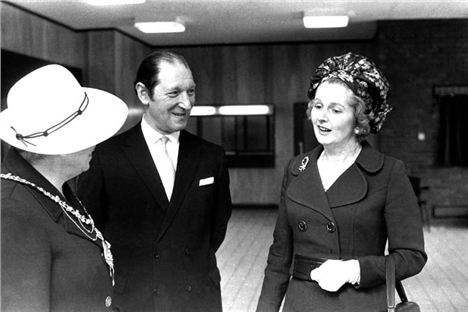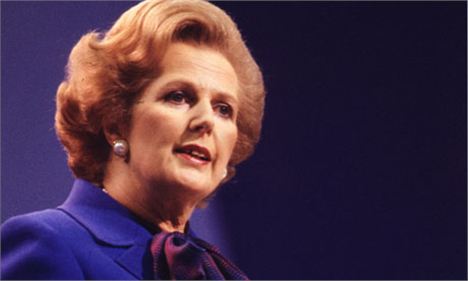I HAVE agonised about this for years but I've decided it's time to come out of the closet.
I had dinner with Margaret Thatcher.
It was a memorable occasion that gave me insight into the so-called Thatcher phenomena. It wasn't a tête-à-tête but it was intimate with only four people in the group.
I learnt at the LSE dinner that she was a scientist by training and was interested in ideas, evidence and argument. That made her distinct and still lends her an authority the present public relations politicos in high office don't possess.
She had come to speak at the Tory Club at London School of Economics (LSE) when she was Education Minister in the Heath Government in the early seventies.
I was at the LSE, and one of my friends from the north was a leadling light in the club (bizzarely I thought). He invited me along.
I was studying politics and economics but I wanted to be a journalist, so that's my alibi as a Labour Party member, for finding myself having dinner with HER and two others after the Tory Club meeting. I recall we ate a very London Shepherd's Pie, totally different from the ones I was used to up here.
How could I have guessed four decades ago at the impact she would have on the country and on my city? Nobody even thought she had a chance of being the Tory leader.
The memories and conversations are still vivid.
 Margaret Thatcher around the time Cllr Karney met her
Margaret Thatcher around the time Cllr Karney met her
First off, she didn't have a 'special presence' as so many have claimed. She struck me as a suburban and pedestrian politician dressed modestly, and with a suburban lady's hair-do, a million miles from the full-on magnificent blond halo that was to come later.
She talked about her father (Alderman Roberts) a lot, and what the Labour Party had done to him. It was a big issue with Thatcher that the Labour Party had aggressively resisted him in Grantham.
Immediately, I could tell her purpose in life was to impress her father, an independent on Grantham Council who had no truck with collectivism of any kind. Trade unions were a no-no for Councillor Roberts, and in turn they would be a no-no for Prime Minister Thatcher.
I sensed the pain of her being patronised by the Tory grandees. They were all male of course, and it seemed to me, natural and right, that her second purpose in life was to take them on and prove the world is not just about wealthy middle-aged men.
She was very polite and very discreet in her opinions, again something at odds with her public persona later. When I raised some ideas about Edward Heath - the biggest sulk in modern politics - she was controlled but her face gave the game away, clearly she shared similar thoughts.
I cannot stress enough that she did not turn heads.
If as the Daily Telegraph now claims, she was Boadicea with pearls, she learnt the part.
As her personal private secretary, and later Cabinet Secretary, Lord Butler has often said, her behaviour and bottle came paradoxically from under-confidence rather than haughty arrogance. She was always playing up to the role, fighting her grammar school path to power despite the public school patronage in the Tories.
There have been politicians where charisma is immediately evident.
When you met Michael Heseltine and Tony Blair they lit up the room in a way you would never forget.
Thatcher at that first meal had none of that. She was more like a John Major or a Gordon Brown, two other PMs I’ve met.
I digress but John Major was so super pedestrian that when he came up after the IRA bomb he sat opposite Richard Leese and me, civil servants at the back, and took out a little notebook from his inside pocket and said, "Now, tell me what you do want me to do for you?"
As it turned out he was good news for Manchester. He wanted to do the best for us, he was totally committed to getting the city back on its feet as quickly as possible.
As mentioned above with Margaret Thatcher I had no sense she would rise as far as she did, and become the most notorious British leader in a generation.
She had luck on her side of course, and immense determination, stemming from her Grantham past, her father, and that desire to prove herself. She was adept too at dealing with, and outwitting, her 'enemies' - the miners, the trade unions and local government, the collective spirit of socialism.
The Labour Party helped her in this. My party played a big part in her victory as premier in 1979
During the 70s the Labour Party had lost contact with ordinary people and their aspirations.
Remember among many actions the labour movement (not the party itself) had supported was the unions picketing cemeteries to stop people being buried and refusing to collect the bins. This was in response to the Labour Prime Minister Jim Callaghan's pay freeze which led to the unions flexing their muscles in the so-called 'Winter of Discontent'.
The Labour Party was guilty by association with the unions and we did little to persuade people differently. We were hopeless at the dark arts of media manipulation.
Still after that 1979 success everyone considered her a one-term Prime Minister - even the Tories. When she won a second term we knew what she was about and I honestly thought of emigrating at the prospect of another spell of her government - I'm sure it crossed the minds of many other Manchester councillors as well.
By this time it was becoming apparent how she had become the first modern Prime Minister to allow her media handlers to help her fashion a winning makeover.
 Margaret Thatcher, polished and perfected
Margaret Thatcher, polished and perfected
The new phenomenon of Margaret Thatcher was cast as a tale to warm the cockles of the hearts of ordinary folk and then to impress them. It began with homely images of ironing and ended with the grotesque, from my point of view, media image of global Iron Lady.
Everyone fell for it and everybody, including herself, got carried away with it. The consequences were devastating. One of these was the catastrophic decision to let industries brutally die off and throw hundreds of thousands on the dole. This was the opposite of what countries such as Germany were doing. It was a proud thing to manufacture products that went round the world. We lost that pride along with the jobs.
I have read her autobiography and those of most in her Tory cabinets, but the Thatcher I met round the dinner table bore no relation to the legend contained in those books. The modern Thatcher/Boadicea character was a myth to frighten her enemies.
And it worked so well.
It scared Labour out of office for almost two decades.
All politicians if they hit on a successful and selling formula will keep selling it. In Thatcher's case this was all about 'the lady's not for turning', the high rhetoric against the Argentines and the Russians, the idea of her being the defender of the British against European Union dilution.
Yet underneath the contrived image we are so familiar with today, I learnt at the LSE dinner that she was a scientist by training and was interested in ideas, evidence and argument. That made her distinct and still lends her an authority the present public relations politicos in high office don't possess.
History will probably be kind to Margaret Thatcher and recognise her role as the first woman Prime Minister of Great Britain.
As a Christian I do not dance on her death.
I hope you get the involved logic when I say, having meet her for dinner and then seeing how she ascended into mythology, it seems to me Thatcher was playing Meryl Streep most of her life as the latter played her in the film The Iron Lady. Thatcher was an actor too, in her own way.
Councillor Pat Karney is the Labour member for Harpurhey Ward. He is also the Lead Member for the City Centre and is well-known for his outspoken championing of the city. Manchester Day (click here) is one of his well-known initiatives to help make the city centre more relevant to all the communities across Manchester.










